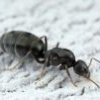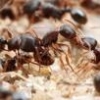Ok day two of using a blacklight trap and no such and still no luck. I am like 100% convinced that no nuptial flights are happening. I am going to go on a three day super queen hunt searching all areas I know. Sidewalks, bodies of water, forests etc. I am going to check in the early morning, midday and in the night for three days. If I find nothing I don't know what to do.
I know the feeling.
When I first started blacklighting, I caught NOTHING for the first several times and started to get discouraged. Until one night, nuptial flights began happening, and then quit a few days later. My tip is: just be patient, and eventually you’ll come across a nuptial flight (and when one does happen, you’ll surely find queens at your blacklight!).
What type of bulb are you using? Is it flourescent or incandescent? Are you sure it's putting out UV light?
The farther away from the equator you are, the less effective a blacklight definitely seems to be. I'm in Northern IL and I don't even bother blacklighting anymore. I would catch Camponotus males, Solenopsis molesta on the very warmest nights of the year, every once in a while find parasitic Lasius, and on one night find some Lasius cf. brevicornis queens. There may be a few species I'm forgetting but you get my point; it's not something I want to spend my time checking every night. A far cry from what you'll see in the far southeast or southwest, often catching queens every night in some places. It is my theory that being the temperature is generally colder up here, it is much more difficult for night time flying to occur. Couple that with a few other things, such as the Northern US having less ants overall than the south, and blacklighting up north quickly becomes an ineffective method for collecting queens.
in my experience it seems a stronger bulb works better up north. I use a 100W mercury vapor bulb and blacklight and rack in tons of bugs every night.
Okay, sure, but I would then ask what would happen if you were to take that same 100W mercury vapor bulb and bring it down south. You didn't even specifically say you were catching ants, just bugs  . Even if my theory is false, it still stands that the farther you move away from the equator the less bugs there are overall.
. Even if my theory is false, it still stands that the farther you move away from the equator the less bugs there are overall.
Currently Keeping:
Trachymyrmex septentrionalis
Pheidole pilifera
Forelius sp. (Monogynous, bicolored) "Midwestern Forelius"
Crematogaster cerasi
Pheidole bicarinata
Aphaenogaster rudis
Camponotus chromaiodes
Formica sp. (microgena species)
Nylanderia cf. arenivega















